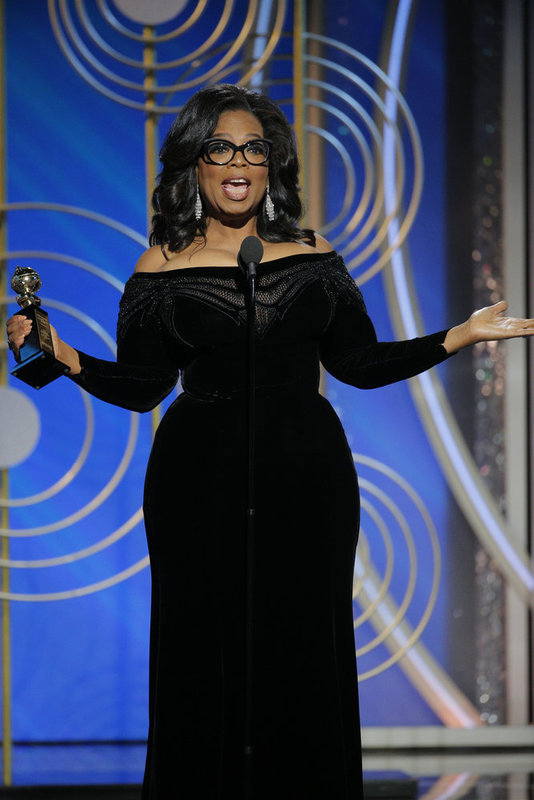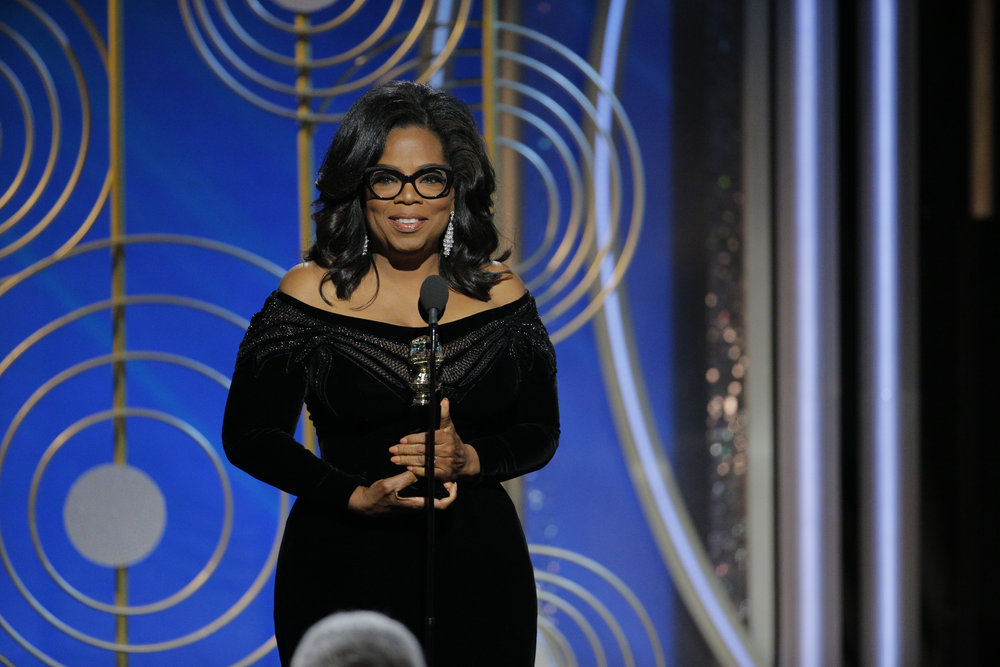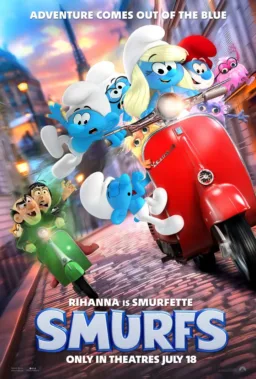Protest was certain. The question was what form would the protest take at the 75th Golden Globes on Sunday night at the Beverly Hilton? One worked: #TIMESUP and the sea of black solidarity. Others like #GoldenGlobesSoWhite sputtered with personal bias.
Before the stars arrived to walk the red carpet, Twitter was alive with detractors of Meryl Streep, who last year had been honored with the Cecil B. DeMille Award and sparked some outrage for her acceptance speech, which some saw as critical of the soon-to-be inaugurated president Donald Trump. That was in January, but by mid-December when plans for women to wear black to protest the abuse of women in the industry were revealed, Streep was criticized by Rose McGowan for remaining silent for years.
At about the same time, a right-wing street artist who goes by the name of Sabo, put out posters in Hollywood with a black-and-white image of Streep with Harvey Weinstein. Both are smiling, but a red block over Streep’s eyes is emblazoned with white letters that declare, “She Knew.”
That wasn’t the only drama before the show even began. The morning of the show, Dylan Farrow sent out a six-part tweet about the 2014 Cecil B. DeMille awardee, Woody Allen, reminding everyone that four years ago she wrote an open letter about “the abuse I sustained at the hands of Woody Allen” because she thought “it would make a difference. I thought things would change.” While she supported the #TIMESUP movement, she wondered when Allen’s time would be up and when he would stop being shielded by his “talent” and “genius.”

In the past, the Golden Globes served as a warning. In 2014, Elisabeth Moss flipped off the E! online mani-cam (and not just once) while talking with E! host Giuliana Rancic. That rumble turned into the 2015 hashtag campaign to #AskHerMore where women demanded to talk about more than their clothes. In 2016, Casey Affleck’s win for Best Actor for “Manchester by the Sea” was criticized due to allegations of sexual harassment from 2010 incident that was settled out of court; Nate Parker’s award hopes for “The Birth of a Nation” were dashed by dismissed rape charges stemming from a 1999 incident.
This year, Debra Messing took time on the red carpet to tell Rancic, “We want diversity, we want intersectional gender parity, we want equal pay. I was so shocked to hear that E! doesn’t believe in paying their female co-hosts the same as their male co-hosts.” Messing continued, speaking out in support of Catt Sadler, a former E! host who quit in December over the pay inequity. Messing said, “We stand with her and that’s something that can change tomorrow. We want people to start having this conversation that women are just as valuable as men.”
Eva Longoria, in a joint interview with Reese Witherspoon, told Ryan Seacrest, “We’re also here for #TIMESUP, we support gender equality and equal pay and we hope that E! follows that lead and we stand with Catt.” Both Longoria and Witherspoon then said, “We stand with you Catt.”
Meryl Streep not only wore black, she was one of several women who brought female activists working against sexual harassment and violence against women as their Golden Globe guests as part of the #TIMESUP activism. Streep’s “date” was National Domestic Workers Alliance Director Ai-jen Poo. Streep told Seacrest, ”I think that people are aware now of a power imbalance, and it’s something that leads to abuse. It’s led to abuse in our own industry and it’s led to abuse across the domestic workers’ field of work. It’s in the military, it’s in congress, it’s everywhere.”
Other stars and nominees brought special guests related to the activism of the evening: Emma Watson brought Marai Larasi, the executive director of Imkaan, a network of organizations working to end violence against black and minority women in the UK; Michelle Williams, nominated for “All the Money in the World,” brought #MeToo founder Tarana Burke; “Feud” nominee Susan Sarandon brought Rosa Clemente, founder of PR (Puerto Rico) On The Map; Shailene Woodley walked the red carpet with Calina Lawrence, a member of the Suquamish Tribe in Washington State, who has advocated for Native American treaty rights and the Water Is Life movement led by the Standing Rock Sioux Tribe; Amy Poehler brought Saru Jayaraman, the president of Restaurant Opportunities Centers United & ROC Action; and Mónica Ramírez, co-founder of Alianza Nacional de Campesinas, a national farmworker women’s organization, walked the red carpet with Laura Dern.
During the ceremony, there was an attempt to trend the hashtag #GoldenGlobesSoWhite. In the Twittersphere people complained about the choice of Allison Janney over Mary J. Bilge and of James Franco over Daniel Kaluuya. Bilge was nominated for her role in Dee Rees’ “Mudbound” (Best Supporting Actress) as well as for Best Original Song (“Mighty River”). Kaluuya was nominated for the horror flick “Get Out.” One person noted, “Just give me one Asian male lead actor.”
Yet this 75th Golden Globes was exceptional on this level for several reasons. Oprah Winfrey became the first African-American woman to receive the Cecil B. DeMille Award (Sidney Poitier received one in 1982 and Denzel Washington in 2016). Sterling K. Brown became the first African-American to win Best Performance by an Actor in a Television Series – Drama ever. Previous Best Actor wins by Bill Cosby, Flip Wilson, Don Cheadle and Redd Foxx were for Best Performance by an Actor in a Television Series – Musical or Comedy.

There were 11 television awards and three (27 percent) went to people of color. “The Marvelous Mrs. Maisel” won Best Television Series – Musical or Comedy for a cast that included Jewish actors Michael Zegen and Alex Borstein. Borstein’s mother is a Holocaust survivor; Zegen’s grandparents are Holocaust survivors. Tony Shalhoub is Lebanese-American. The titular character is Jewish, but played by a non-Jew Rachel Brosnahan who won a Best Performance by an Actress in a Television Series – Musical or Comedy.
Out of 14 motion picture awards, three went to minorities. Mexican-born Guillermo del Toro won Best Director – Motion Picture for “The Shape of Water.” Directors Lee Unkrich and Mexican-American Adrian Molina shared a Golden Globe for the Disney-Pixar animated feature “Coco” which won Best Motion Picture – Animated. Benj Pasek (part Jewish) and Justin Paul shared an award for Best Original Song – Motion Picture, “This is Me” from “The Greatest Showman.”
The highlight of the night arguably came during the presentation of the Cecil B. DeMille Award to Oprah Winfrey, and the passionate speech that followed. Reese Witherspoon, who co-stars with Winfrey in the upcoming “A Wrinkle in Time,” introduced Winfrey, saying, “There are a lot of people known on a first-name basis, but there’s only one person whose name is a verb, an adjective, and a feeling. And that is Oprah.” She described working with Winfrey as “like going to Wharton Business School combined with a spiritual retreat, all in one. I learned everything from how to make the best English muffin, to what it’s like being the only woman as a board member at a huge company.”
Winfrey’s acceptance speech was one of progress and hope. You really should take the time to watch it below:
Backstage, Winfrey said she was humbled when she first got the call from the Hollywood Foreign Press because she has done so few movies. “I didn’t understand it, and then they explained that it’s about overall entertainment. Now, what I was able to do with the Oprah show and the cultural statement we were able to make throughout the world, I feel very, very, very proud of that, but I think that when it comes to films, that I am really the new kid on the block, and I always feel like when I’m acting, that I am out of my box. It’s the most intimidated I ever feel.”

Her advice to people interested in the entertainment field is: “Do stuff you love.” She further explained, “for 25 years I worked on the Oprah show, and I will tell you there were nights when I came home, and it was hard to even take off my clothes because I knew I was going to be getting up four hours later. But I never really felt exhausted, like depleted. I felt exhausted, but I never felt depleted. So, do the work that comes straight from the soul of you, from your background, from stories that you’ve grown up with, from stories that bring you passion, from stories that you are not just drawn to tell, but if you don’t tell them, they don’t get told. “
On how to give a good interview, Winfrey explained that everyone is basically the same. “I started to see that there this common thread in humanity where everybody wants to know: How was that? Did I do okay? Did you hear me? And did what I say mean something to you? So I would have to say that recognizing that in other people has helped me to become, you know, a person of compassion, a person of understanding, a person who can interview anybody about anything because I know that at the core of you is the same as the core of me. You just want to be heard.”
When asked about advice, Winfrey revealed, “The greatest lesson I’ve learned throughout my career came from Maya Angelou, actually, when I was first meeting her. And after I’d known her for a while, she said, ‘Baby, you know, you need to know that when people show you who they are, you believe them the first time” and not wait until the 29th time. “So I think that has been one of my greatest wisdom teachings, is to assess from people’s behavior, their actions, not just towards me, but towards other people, who they are and how they behave. Because if people talk about other people, they’ll talk about you. So I think in business and personal relationships, that’s always been my greatest lesson. Also staying grounded, you know, has been really great for me.”
A reporter asked about how this year was different from last year when Streep won the award. Winfrey kept positive, commenting, “that when something really negative is brewing, that there is the direct opposite reaction that is also possible.” When the Harvey Weinstein scandal unfolded, she recalled, “I thought here is an opportunity for something powerfully—a powerful growth, and how do we use this moment to elevate what is happening instead of continually victimize ourselves. And so I think that wearing black in solidarity is one step. I think that what #TIMESUP is doing with the legal defense fund is a major step. It was very important to all of us involved with #TIMESUP that it not just about the women of Hollywood, because we are already a privileged group, but to extend to the women of the world. Because as I said tonight, there isn’t a culture, a race, a religion, a politic, a workplace that hasn’t been affected by it. And one of the reasons why I wanted to tell Recy Taylor’s story is to let people know it’s been happening for a very long time. When people didn’t feel that they could speak up, and there’s so many women who have endured so much and remained silent and kept going because there was no other recourse, and now that we’ve all joined as one voice, I think that it feels like empowerment to those women who never had it.”












